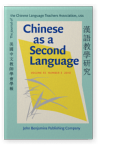The knowledge base of Chinese as a second language teaching in K-12 settings
Staking out the territory
The field of teaching Chinese as a second language (CSL) is expanding and growing in importance worldwide. Related
fields, such as Chinese language pedagogy, language policy, and the acquisition of Chinese as a second language, are attracting
increased attention in research. However, research into K-12 CSL teacher cognition (what teachers know, think, and believe) has
been very limited. It has been reported that more understanding of language teacher cognition has significant impacts on the
development of teacher training and professional development programs (Borg, 2015;
Kubanyiova & Feryok, 2015). Many aspects of CSL teacher cognition are
underexplored when compared with language teacher cognition research in general and K-12 language teacher cognition research
specifically. This article reviews current theoretical and empirical research into language teacher cognition with a particular
focus on existing studies in the field of CSL teaching in the context of K-12 education. The purposes of the review article are
(1) to document the current knowledge base of CSL teaching, and (2) to discuss current gaps in and future directions of teacher
cognition research in this area. It first discusses general theories and research concerning second language teacher cognition
within current research paradigms, and then provides a review of CSL teacher cognition research. Finally, it reviews pressing
issues and suggests directions for future research in K-12 Chinese teacher cognition.
Article outline
- Introduction
- Language teacher cognition
- K-12 CSL teacher cognition research
- Teachers’ general adjustments and challenges in Western educational contexts
- Perceptions related to students, teacher-student relationships, and teachers’ roles in class
- Teachers’ technological knowledge and beliefs
- Summary
- Future directions for K-12 CSL teacher cognition research
- Conclusion
-
References
References (16)
Borg, S.
(
2001)
Self-perception and practice in teaching grammar.
ELT Journal.
55
(1), 21–29.


Borg, S.
(
2015)
Teacher cognition and language education: Research and practice. London: Bloomsbury Academic.

Breen, M. P., B. Hird, M. Milton, R. Oliver and A. Thwaite
(
2001)
Making sense of language teaching: Teachers’ principles and classroom practices.
Applied Linguistics,
22
(4), 470–501.


Burns, A.
(
1992)
Teacher beliefs and their influence on classroom practice.
Prospect,
7
(3), 56–66.

Haley, M. H., and Ferro, M. S.
(
2011)
Understanding the perceptions of Arabic and Chinese teachers toward transitioning into U.S. schools.
Foreign Language Annals,
44
1, 289–307.


Kubanyiova, M. and Feryok, A.
(
2015)
Language teacher cognition in applied linguistics research: Revisiting the territory, redrawing the boundaries, reclaiming the relevance.
The Modern Language Journal,
99
(3), 435–449.


Liu, H., Lin, C.-H., Zhang, D., & Zheng, B.
(
2018)
Chinese language teachers’ perceptions of technology and instructional use of technology: A path analysis.
Journal of Educational Computing Research,
56
(3), 396–414.


Lü, C., and Lavadenz, M.
(
2014)
Native Chinese-speaking K-12 language teachers’ beliefs and practices.
Foreign Language Annals,
47
(4), 630–652.


Meijer, P. C., Verloop, N. and Beijaard, D.
(
2001)
Similarities and differences in teachers’ practical knowledge about teaching reading comprehension.
Journal of Educational Research.
94
(3), 171–184.


Moloney, R., & Xu, H. L.
(
2012)
We are not teaching Chinese kids in Chinese context, we are teaching Australian kids in Australian Schools, 470–487. In,
Aishah, M. K.,
Chan, W. M.,
Chi, S. W.,
Chin, K. N.,
Istanto, J. W.,
Nagami, M.,
Sew, J. W.,
Suthiwan, T.,
Walker, I. (Comps.) (2012):
Culture in foreign language learning: Framing and reframing the issue. Singapore: National University of Singapore Centre for Language Studies.

Shulman, L. S.
(
2000)
Teacher development: Roles of domain expertise and pedagogical knowledge.
Journal of Applied Developmental Psychology,
21
1, 129–135.


Sun, D.
(
2012)
“Everything goes smoothly”: A case study of an immigrant Chinese language teacher’s personal practical knowledge.
Teaching and Teacher Education,
28
(5), 760–767.


Wang, L.
(
2016)
Teachers’ beliefs and their belief change in an intercultural context: CSL teachers in Denmark. Aalborg Universitetsforlag. Ph.d.-serien for Det Humanistiske Fakultet, Aalborg Universitet,


Wang, L., and Du, X.
(
2014)
Chinese Teachers’ professional identity and beliefs about the teacher-student relationships in an intercultural context.
Frontiers of Education in China,
9
(3), 429–455.


Wang, W. and Kuo, N.
(
2016)
Chinese language teachers’ instructional contexts, knowledge, and challenges in teaching students with special needs.
Chinese as a Second Language,
51
(2), 138–163.

Zhou, W., and Li, G.
(
2015)
Chinese language teachers’ expectations and perceptions of American students’ behavior: Exploring the nexus of cultural differences and classroom management.
System,
49
1, 17–27.


Cited by (1)
Cited by 1 other publications
Zhu, Junling
2023.
Critical Literature Review on Teaching Chinese as a World Language in the Context of Globalization.
Language and Sociocultural Theory 9:2

This list is based on CrossRef data as of 1 july 2024. Please note that it may not be complete. Sources presented here have been supplied by the respective publishers.
Any errors therein should be reported to them.
